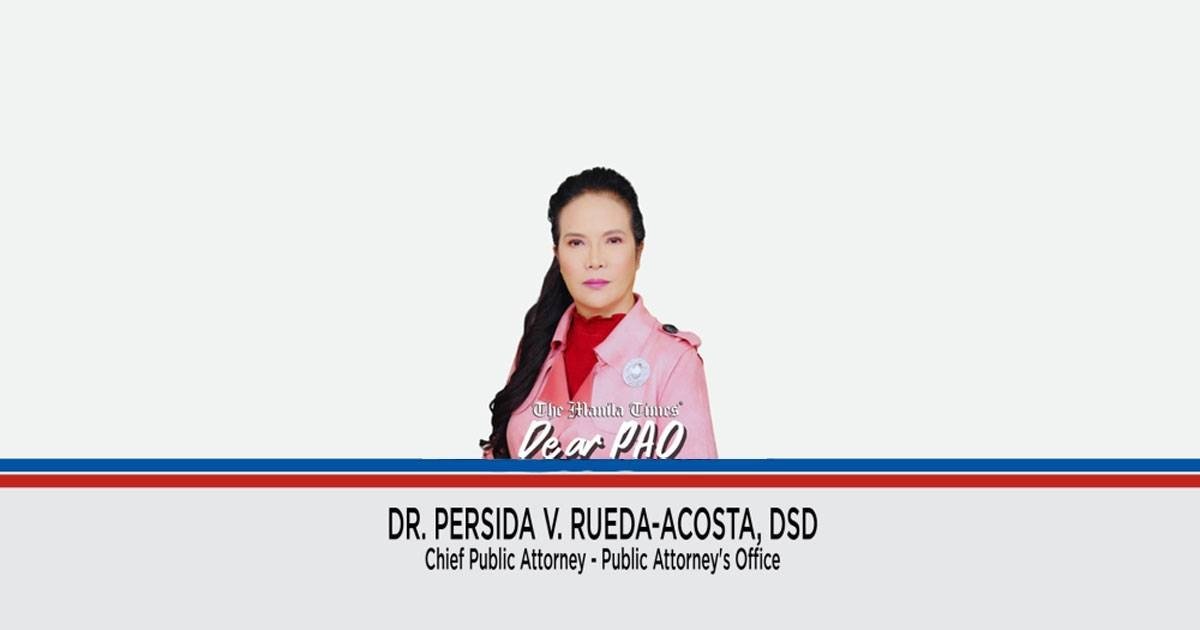
Dear PAO,
I want to file a petition for annulment of judgment, but I am unsure if I can pursue it. From what I have read online, such a petition can only be filed if the court that rendered the questioned decision lacks jurisdiction or if there was extrinsic fraud. In my situation, I was not afforded due process. I was neither notified nor made a party to the case brought before the court, but my right as an heir was prejudiced by the court’s decision. A friend, who is still a law student, said that a petition for annulment of judgment can also be filed on the grounds of denial of due process. Is this correct?
Suzy
Dear Suzy,
Under our Rules of Civil Procedure, the remedy of annulment of judgment can be pursued only when there is extrinsic fraud or if the court that rendered the questioned judgment lacks jurisdiction. This is expressly provided for under Section 2, Rule 47 of the 2019 Amendments to the 1997 Rules of Civil Procedure (AM 19-10-20-SC), which states that:
“Section 2. Grounds for annulment. — The annulment may be based only on the grounds of extrinsic fraud and lack of jurisdiction.
“Extrinsic fraud shall not be a valid ground if it was availed of, or could have been availed of, in a motion for new trial or petition for relief.”
Nevertheless, jurisprudence has it that a petition for annulment of judgment may be resorted to by a party who was denied due process. As explained by the Supreme Court, through Associate Justice Mario Lopez, in the case of Charnnel Shane Thomas v. Rachel Trono and the Republic of the Philippines (GR 241032, March 15, 2021):
“A petition for annulment of judgment is a remedy in equity so exceptional in nature that it may be availed of only when other remedies are wanting, and only if the judgment, final order, or final resolution sought to be annulled was rendered by a court lacking jurisdiction, or through extrinsic fraud. Under Section 2, Rule 47 of the Rules of Court, the grounds for annulment of judgment are: (1) extrinsic fraud; and (2) lack of jurisdiction. Jurisprudence, however, recognizes a third ground — denial of due process of law. In Arcelona v. Court of Appeals, we declared that a decision which is patently void may be set aside on grounds of want of jurisdiction or noncompliance with due process of law, where mere inspection of assailed judgment is enough to demonstrate its nullity.
“Due process requires that those with interest in the subject matter in litigation be notified and be afforded an opportunity to defend their interests. As guardians of constitutional rights, courts cannot be expected to deprive persons of their rights to due process while at the same time be considered as acting within their jurisdiction. Where the denial of the fundamental right of due process is apparent, a decision rendered in disregard of that right is void for lack of jurisdiction.
“In this case, Charnnel, as an heir of Alphonso, is vested with the legal standing to assail the marriage of Alphonso and Rachel by seeking the annulment of the RTC’s Order dated June 28, 2011. In Niñal v. Bayadog, the Court ruled that void marriages governed by the New Civil Code can be questioned even after the death of either party. The death of a party does not extinguish the action for petition for declaration of absolute nullity of marriage as the deceased may have heirs with legal standing to assail the void marriage. As borne by the records, Charnnel was neither made a party to the proceedings nor was she duly notified of the case. Also, she was a minor at the time the RTC granted the OSG’s motion. While Jocelyn was able to file a Manifestation and Special Appearance on the OSG’s motion for reconsideration, this should not bind, much less prejudice, Charnnel as a perusal of it readily shows that Charnnel’s interests as Alphonso’s heir were not directly raised and threshed out in this pleading. To hold otherwise would be tantamount to depriving a then innocent child, now rightfully asserting her rights, of due process of law.” (Emphasis supplied)
It bears stressing, though, that you may only pursue filing a petition for annulment of judgment if there is no other remedy available to you to assail the questioned decision of the court. These other remedies include filing a motion for a new trial, appeal, petition for relief, petition for certiorari, and so on. More importantly, such absence of remedy must be without your fault. If there is still another remedy available to you, you must pursue that instead of filing a petition for annulment of judgment. If the want of remedy was due to your own fault, then you may not validly pursue filing a petition for annulment of judgment. This is in consonance with Section 1, Rule 47 of the said amended rules, which states:
“Section 1. Coverage. — This Rule shall govern the annulment by the Court of Appeals of judgments or final orders and resolutions in civil actions of Regional Trial Courts for which the ordinary remedies of new trial, appeal, petition for relief or other appropriate remedies are no longer available through no fault of the petitioner.”
We hope that we were able to answer your queries. This advice is based solely on the facts you have narrated and our appreciation of the same. Our opinion may vary when other facts are changed or elaborated.
Editor’s note: Dear PAO is a daily column of the Public Attorney’s Office. Questions for Chief Acosta may be sent to [email protected].







